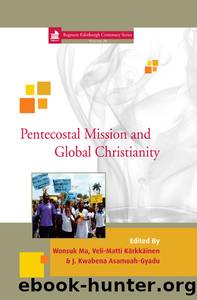Pentecostal Mission and Global Christianity (Edinburgh Centenary) by Wonsuk Ma Veli-Matti Kärkkäinen J. Kwabena Asamoah-Gyadu

Author:Wonsuk Ma, Veli-Matti Kärkkäinen, J. Kwabena Asamoah-Gyadu
Language: eng
Format: azw3
ISBN: 9781908355430
Publisher: Words By Design
Published: 2014-01-31T23:00:00+00:00
GLOBAL CHRISTIANITY AND ECUMENISM IN ASIAN PENTECOSTALISM1
Connie Au
The Paradoxes between Edinburgh 1910, Asians and Pentecostals
Edinburgh 1910 was convened with a zealous expectation of the advent of Godâs kingdom through the seemed-to-be promising expansion of missionary enterprise. At the opening session of the conference, Archbishop of Canterbury Randall Davidson confidently declared, âIt may well be that âthere be some standing here tonight who shall not taste of death till they seeâ, â here on earth, in a way we know not now, â âthe Kingdom of God come with powerââ.2 This declaration was proved to be true in the rest of the twentieth century, but ironically, the Archbishop himself and his addressees at the conference were not the key players of its realisation, but those who were not invited â the Africans, Latin Americans and Asians. Out of 1215 delegates, eighteen Asians and one African attended, but no Latin Americans.3 Although the conference committee had encouraged missionary societies to invite local Christians to participate two years before the conference started, since the majority of the natives came from undeveloped countries like China and India and their expenses had to be met by fund raising or provided by missionary societies, only a few of them could attend eventually.4 Some missionaries perceived that the conference was a gathering of mission executives and leaders; hence the presence of local Christians did not match its purpose.5
Another Christian group that was missing at the conference was the Pentecostals, who were still at the infant stage of mission, but they have turned out to be the major contributors of the realisation of the conferenceâs motto, âthe evangelization of the world in this generationâ.6 Compared to the meticulous strategic mission planning at Edinburgh, the spontaneity of Pentecostalism through following the direct guidance of the Holy Spirit and performance of gifts enabled its missionaries to effectively contextualise the gospel, especially among the pragmatic and sometimes illiterate Asian people. Compared to the gospel message of the salvation of the soul and eternal life, the full gospel emphasised by Pentecostals conveys a here-and-now holistic deliverance and the hope of eternity in the future. They are fully aware of the power of the cosmological world featured in animism, witchcraft and ancestor worship in Asia. They demonstrate the power of the almighty God in a spiritual warfare and through casting out demons and healing ministry. Pentecostal missionaries set out to the mission fields with a train or ship ticket, little money but tremendous faith, believing in Godâs supply. Indigenous Asian Pentecostals live under poverty but abundance in the power of the Spirit and faith in the Word, but they play a significant role in the conversion of their own people.7
Edinburgh 1910 has been known more for its ecumenical legacy than for its missionary contribution to the world. The ecumenical movement has been supported by mainline Protestant and Orthodox churches, which were involved in the Faith and Order, and the Life and Work movements and in the various structures of the World Council of Churches (WCC).
Download
This site does not store any files on its server. We only index and link to content provided by other sites. Please contact the content providers to delete copyright contents if any and email us, we'll remove relevant links or contents immediately.
| Adult Ministry | Children's Ministry |
| Counseling & Recovery | Discipleship |
| Evangelism | Missions & Missionary Work |
| Preaching | Sermons |
| Youth Ministry |
Victory over the Darkness by Neil T. Anderson(2862)
The Rape Of Nanking by Iris Chang(2814)
Chosen by God by R. C. Sproul(2161)
Habits of Grace by David Mathis(1976)
Crash the Chatterbox by Steven Furtick(1974)
Knowing God by J.I. Packer(1855)
How To Be Born Again by Billy Graham(1778)
A Prophet with Honor by William C. Martin(1719)
Gospel-Shaped Marriage by Chad van Dixhoorn(1716)
Peace with God by Billy Graham(1683)
Confronting Christianity by Rebecca McLaughlin(1589)
God's Smuggler by Brother Andrew(1542)
Angel Dreams by Virtue Doreen Virtue Melissa(1476)
Whisper by Mark Batterson(1452)
The School of Biblical Evangelism by Ray Comfort(1437)
Missionaries by Norman Lewis(1427)
The Truth War by John MacArthur(1423)
The Poems of Rowan Williams by Rowan Williams(1355)
Do Greater Things by Robby Dawkins(1324)
